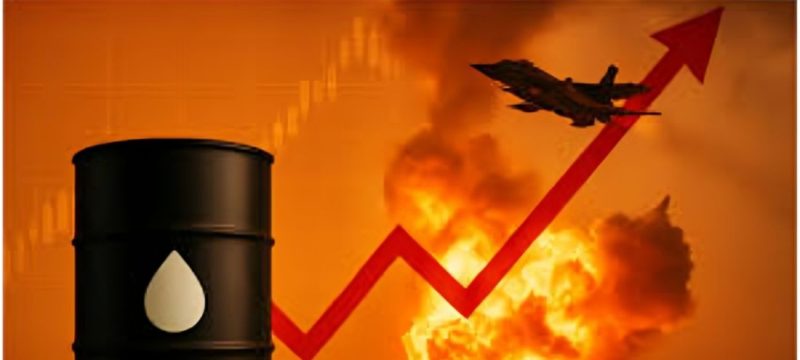Oil prices surged while global stock markets dipped on Monday, following U.S. airstrikes on Iran’s nuclear facilities over the weekend. The escalation raised concerns about a broader Middle East conflict and potential disruptions to vital energy supply routes.
Brent crude initially jumped 5.7% before settling with a 2.7% gain at $79.12 per barrel, while U.S. crude rose 2.8% to $75.98. The spotlight turned to the strategic Strait of Hormuz — a key chokepoint through which nearly 25% of global oil and 20% of LNG pass — as investors feared possible Iranian retaliation.
Read more: Crude Oil Prices Dip as Trump Postpones Call on U.S. Role in Israel-Iran Conflict
U.S. stock futures showed declines, with S&P 500 and Nasdaq futures slipping 0.3% and 0.6% respectively. Asian markets followed suit, with Japan’s Nikkei falling 0.9% and MSCI’s Asia-Pacific index (excluding Japan) down 0.5%. European futures also indicated a weak open, with major indices such as the DAX and FTSE down 0.7% and 0.5%.
The market jitters stemmed from coordinated U.S. strikes on Iranian nuclear facilities in Natanz, Fordow, and Isfahan. Iran condemned the actions as a breach of sovereignty and warned of “everlasting consequences.” Meanwhile, Israel continued its military operations, targeting multiple locations within Iran.
Josh Gilbert of eToro commented that market uncertainty has become the new norm, with oil price volatility and geopolitical instability likely to keep investors on edge. Much now depends on how Iran chooses to respond, with experts suggesting retaliation is almost inevitable.
According to Dr. Ben Zala from Monash University, investors across various asset classes — including stocks, bonds, and currencies — will react to developments as they unfold. Meanwhile, the U.S. dollar strengthened slightly amid a safe-haven bid, and Treasury yields edged up. Gold prices, which initially spiked, later settled around $3,363 per ounce.
Asian oil and shipping stocks rallied on speculation that Persian Gulf shipping rates may increase. Defense sector shares climbed, while airline stocks dropped due to the expected rise in fuel costs.
Although the oil market reacted strongly, some analysts view the response as controlled, likely due to prior investor hedging and reduced equity exposure. Ataru Okumura of SMBC Nikko Securities noted that historic patterns — like during the Gulf War — have seen U.S. markets eventually recover due to government spending in response to conflict.
In credit markets, spreads on Asian investment-grade dollar bonds (excluding Japan) widened to their highest levels in over a month, reflecting increased concern about credit risk.
The situation has renewed fears of global inflation and supply chain issues, particularly due to the vulnerability of the Strait of Hormuz. Commonwealth Bank of Australia analyst Vivek Dhar suggested that selective disruptions to shipping, rather than a full closure, could still cause major consequences — potentially pushing Brent crude above $100 per barrel.
Geopolitical tension also overshadowed key economic events scheduled for the week, including manufacturing data from the U.S. and Europe, and upcoming remarks from Federal Reserve officials. San Francisco Fed President Mary Daly indicated that interest rates are well-positioned, hinting at a possible rate cut in the fall, while Fed Governor Christopher Waller has suggested a cut might even happen by July.
Meanwhile, tech stocks such as Taiwan Semiconductor, Samsung, and SK Hynix slipped after reports that the U.S. might revoke tech waivers for firms operating in China.
With Israel intensifying operations and Iran yet to make its next move, global financial markets remain tense. As one energy strategist in London put it, “The next move belongs to Iran — and the world is watching anxiously.”









